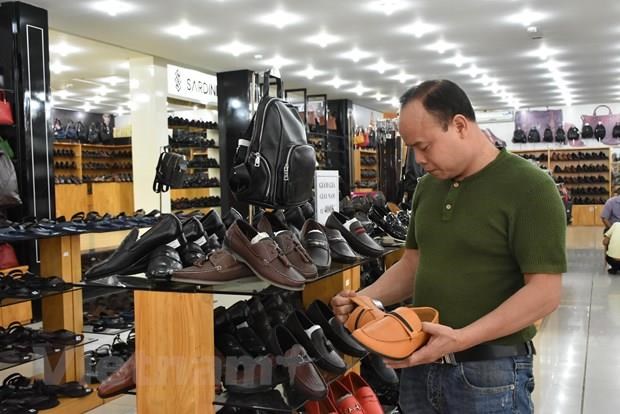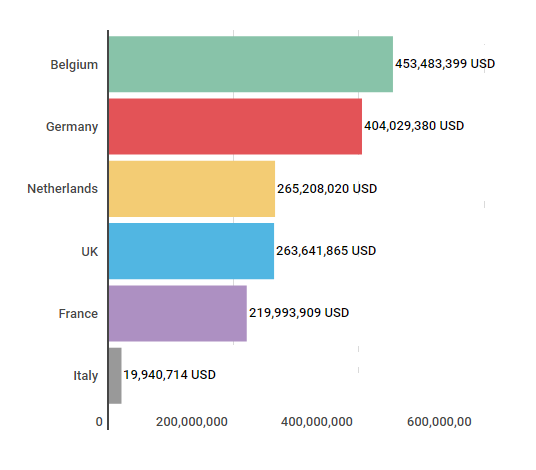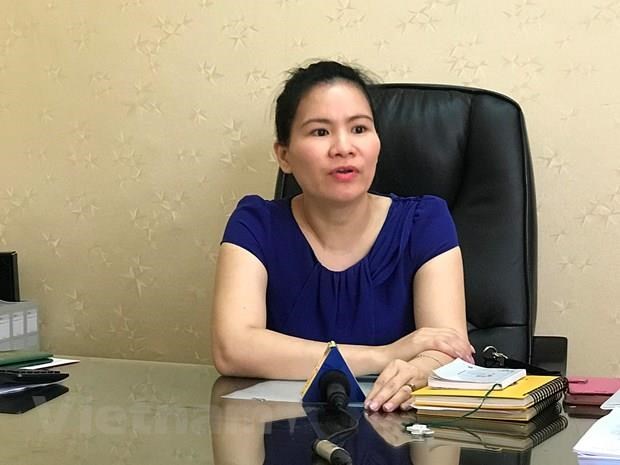Domestic firms advised to observe export regulations
Hanoi (VNA) – Vietnamese exporters, especially newcomers, must observe export regulations set by the European Union (EU), said Vice President of the Vietnam Leather, Footwear and Handbag Association (Lefaso) Phan Thi Thanh Xuan.

The EU market makes up about 29 percent of Vietnam’s total leather and footwear export revenue in 2018.(Photo: VietnamPlus)
Xuan said EU investors have paid more attention to Vietnam in recent years and the EU-Vietnam Free Trade Agreement (EVFTA), once effective, is expected to turn Vietnam into an attractive destination to European investors.
- How will the EVFTA benefit leather-footwear businesses?
Phan Thi Thanh Xuan: Vietnam’s exports to the EU grow only about 5-6 percent annually. Besides, export revenue to the market accounts for only 28-30 percent of the sector’s accumulated export value.
One of the reasons behind these facts is the economic slowdown in the EU, along with the Brexit issue, which has harmed Vietnam’s footwear orders.
Therefore, the EVFTA is expected to help Vietnam’s footwear exports to the market rebound.
Under the deal, Vietnam will learn from footwear production technologies of developed countries like Germany and Italy, and import materials and accessories in service of the industry’s middle and high-end segments.
- Vietnam’s footwear export revenue to some EU countries in the first five months of 2019
 Photo: VietnamPlus
Photo: VietnamPlus
- How are local leather-footwear businesses preparing to satisfy the EVFTA’s rules of origin? And what are the shortcomings?
Phan Thi Thanh Xuan: The rules of origin are no big deal to Vietnamese enterprises as the domestic footwear sector has benefited from the EU’s generalised system of preferences (GSP) which is exclusively for developing economies like Vietnam.
Vietnamese firms have worked to satisfy the rules of origin even before negotiations on the EVFTA kicked off, and these rules experienced almost no changes.
However, such incentives will lead to trade frauds and falsification of rules of origin, which will harm not a single firm, but the entire business community. If an enterprise falsifies rules of origin, the EU would warn the whole industry.
This is a big challenge that has forced the association and State management agencies to take measures to help businesses be fully aware of the issue.
I think that enterprises, especially new exporters, should observe export regulations.
Meanwhile, those which have succeeded in exporting to the EU should take measures to closely control products as well as partners to avoid the export of goods of unknown origin in the name of Vietnam.
I propose State management agencies keep close watch on export statistics, especially seaport transfer, and take countermeasures when detecting signs of violations.
These agencies should take a serious look at the issue to create favourable conditions for enterprises to export while ensuring a transparent business environment.
 Phan Thi Thanh Xuan, Vice President of the Vietnam Leather, Footwear and Handbag Association (Lefaso) (Photo: VietnamPlus)
Phan Thi Thanh Xuan, Vice President of the Vietnam Leather, Footwear and Handbag Association (Lefaso) (Photo: VietnamPlus)
- How can we attract European investors in the leather and footwear sector, especially the production of materials and accessories while helping domestic firms maintain their foothold at home?
Phan Thi Thanh Xuan: Each country and partner has its own strengths and we should optimise them. For example, EU firms have advantages of capital and technologies. However, they have to work with local businesses to learn about business procedures and culture in Vietnam, which also has an abundant workforce.
The cooperation would help both Vietnam and the EU bring into full play their opportunities.
- Currently, Italy is working to help Vietnam develop the leather and footwear sector. Can you give more details of this?
Phan Thi Thanh Xuan: Vietnam’s leather and footwear sector has faced difficulties in design and market access. Meanwhile, Italy has strength in this sphere. The Italian side visited Vietnam and launched a cooperation project with Lefaso, aiming to develop the workforce for the industry.
The focus of the cooperation is developing designers and managers, and accessing cutting-edge production technologies.
Annually, the Italian side funds trips of Vietnamese leather and footwear businesses to EU countries to learn about their technologies, designs, fashion trends and consumer tastes.
Such support has partially fulfilled domestic firms’ demand and opened doors for them to expand their reach to world markets.
Apart from Italy, Taiwan and the Republic of Korea have also assisted the Vietnamese leather and footwear sector in developing the supporting industry. Meanwhile, Japan has implemented support programmes for the Southeast Asian nation in the sector.
Foreign governments have paid attention to technical assistance to Vietnam, while helping the country deal with other weaknesses, aiming to promote bilateral trade.
I believe once the EU-Vietnam Free Trade Agreement comes into force, Vietnam will become more attractive to EU investors.
- How can we help the leather and footwear sector utilise benefits brought about by free trade agreements?
Phan Thi Thanh Xuan: Firstly we need to provide information and training. Therefore, information channels should be diversified to enable businesses to access information as fast as possible.
The implementation remains a problem due to limited resources. Given this, it is necessary to devise training policies, meeting the demand of businesses.
Besides, trade promotion programmes would help firms approach the markets and create a network connecting domestic and foreign businesses.
The State should run programmes for businesses while the association would be a channel to help them get more information, thus improving their competitiveness.
- Thank you./.













